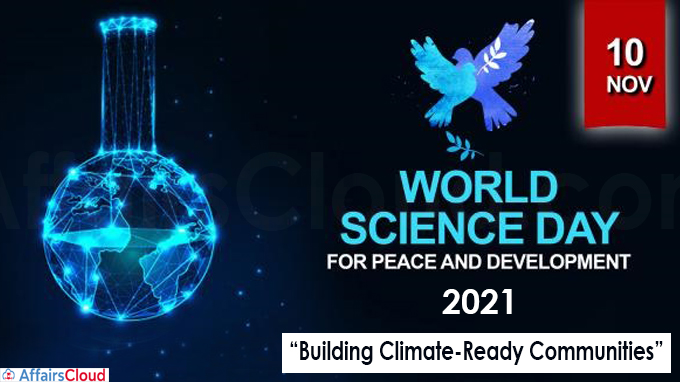
The United Nations(UN)’s World Science Day for Peace and Development is annually observed across the globe on November 10th to highlight the importance of science in society and the need to engage the public in the debates on emerging scientific issues.
- 10th November 2021 marks the observance of the 20th edition of World Science Day for Peace and Development.
The theme of World Science Day for Peace and Development 2021 is “Building Climate-Ready Communities”.
Purpose of World Science Day for Peace and Development:
- Strengthen public awareness of the role of science for peaceful and sustainable societies;
- Promote national and international solidarity for shared science between countries;
- Renew national and international commitment for the use of science for the benefit of societies;
- Draw attention to the challenges faced by science in raising support for the scientific endeavour.
Background:
i.The 31 C/Resolutions 20 adopted by the United Nations Educational, Scientific and Cultural Organization(UNESCO) in 2001 proclaimed the 10th November of every year as the World Science Day for Peace and Development.
ii.The first ever World Science Day for Peace and Development was observed on 10th October 2002.
Significance:
i.The observance of the focused event related to the commitment to science and society is one of the positive outcomes of the 1999 World Conference on Science in Budapest.
ii.The observance also reaffirms the commitment to attain the goals proclaimed in the Declaration on Science and the Use of Scientific Knowledge and to follow up the recommendations of the Science Agenda: Framework for Action.
UNESCO Science Report:
i.The UNESCO Science Report was launched in 1993 under the name World Science Report. Since then, UNESCO has published 7 reports in the series.
ii.The report is one of the tools which can be used by the countries to monitor the progress towards the goals of Agenda 2030.
iii.Every 5 years, the report analyses the emerging trends in science, technology and innovation policy and governance.
iv.The 2021 UNESCO Science Report: The Race Against Time for Smarter Development, the latest edition(7th edition) of the report was published in June 2021.
UNESCO Kalinga Prize for the Popularization of Science:
i.The UNESCO Kalinga Prize for the Popularization of Science created in 1951 is the oldest prize of UNESCO.
ii.The prize was created following the donation from Mr Bijoyanand Patnaik, Founder and President of the Kalinga Foundation Trust in India.
iii.At present, the prize is funded by the Kalinga Foundation Trust, the Government of the State of Orissa, and the Department of Science and Technology, the Government of India.
Laureate of 2021 UNESCO Kalinga Prize for the Popularization of Science:
Jean-Pierre Luminet, astrophysicist and cosmologist from France has been awarded the 2021 UNESCO Kalinga Prize for the Popularization of Science for promoting scientific research through a variety of media.